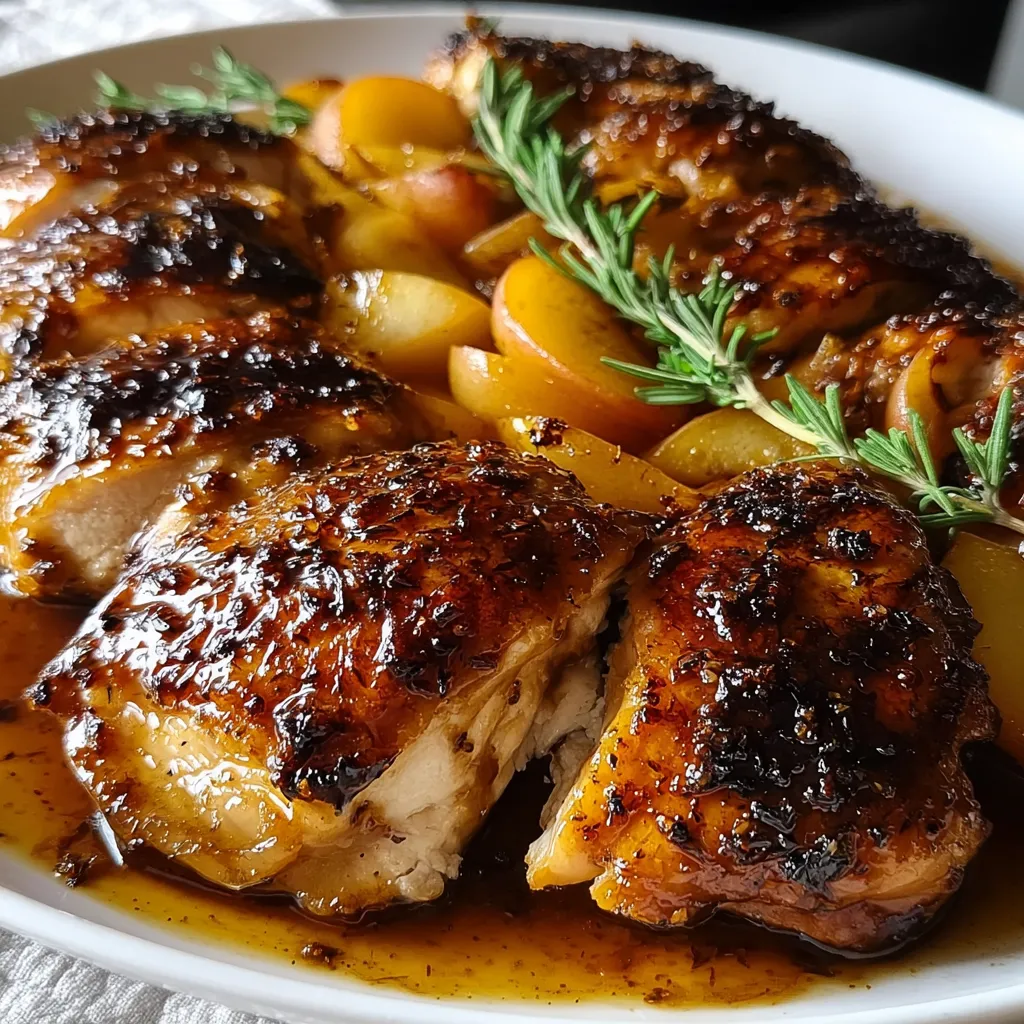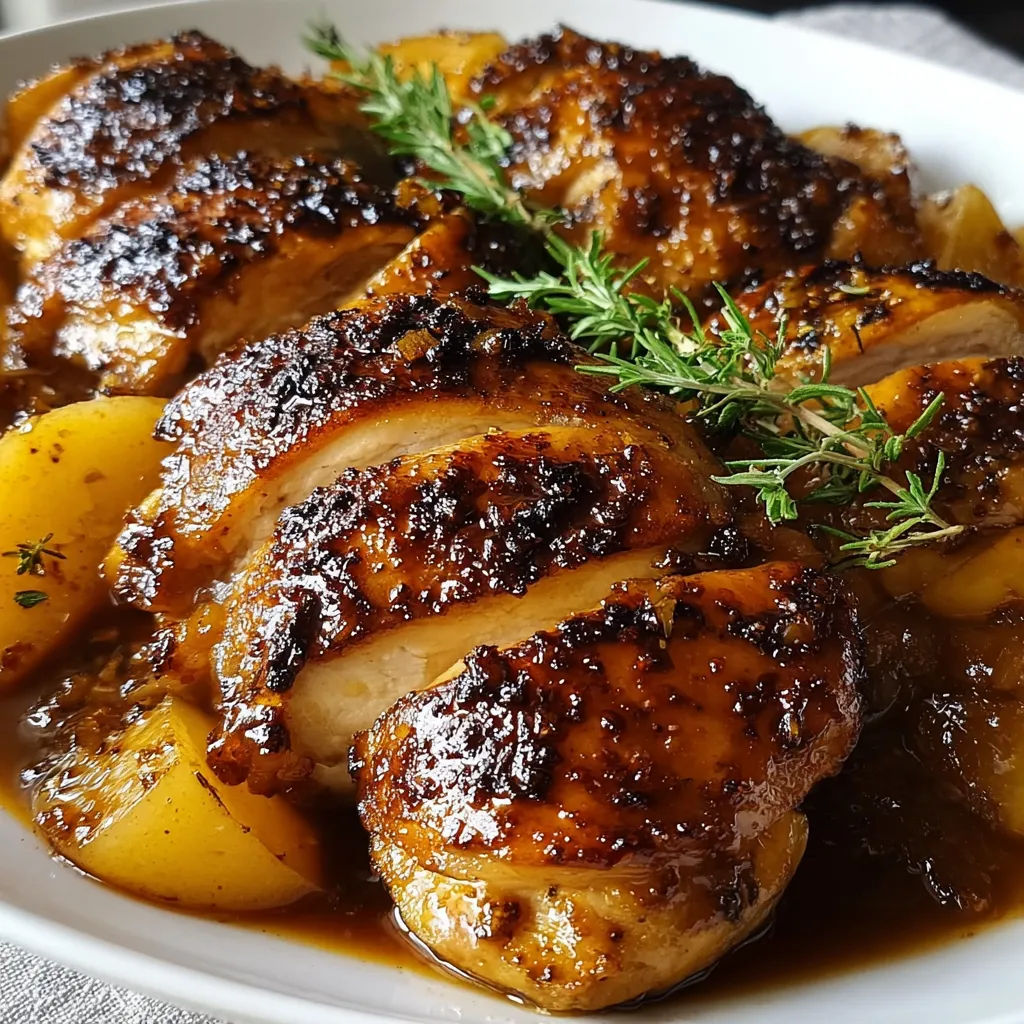 Save
Save
Apple cider chicken brings together juicy chicken thighs and a caramelized cider glaze for a comforting weeknight dinner that always hits the spot. This is the dish I reach for when apples are fresh and the air turns crisp because it is quick to prepare and bridges the seasons beautifully.
When I first tried apple cider as a cooking ingredient, my kitchen filled with the coziest aroma. Now this is my go-to when I need something crowd-pleasing but low effort.
Ingredients
- Chicken thighs boneless and skinless: These stay juicy and soak up the flavors You get more tenderness than chicken breast
- Apple cider: choose fresh unfiltered cider if possible for depth of flavor It reduces into a beautiful syrupy glaze
- Garlic: use fresh cloves for pungency Mincing releases all of their natural oils
- Honey: select local honey for the best floral notes It adds sweetness and helps the chicken caramelize
- Dijon mustard: look for a smooth Dijon as it brings tang and stops the dish from getting too sweet
- Fresh thyme: chop just before using for the most fragrance Its earthy brightness keeps the sauce lively
- Salt and pepper: freshly cracked for best seasoning and balanced flavor
- Balsamic vinegar: aged balsamic gives the glaze complexity and gentle tartness
Step-by-Step Instructions
- Preheat and Prep:
- Set your oven to 400 degrees Fahrenheit or 200 degrees Celsius Lightly coat a baking dish with a drizzle of oil or nonstick spray so the chicken does not stick later
- Season the Chicken:
- Pat chicken thighs dry with paper towels for crispier skin Generously season all sides with salt and pepper and arrange them snugly in the baking dish so they bake evenly
- Make the Glaze:
- Combine apple cider honey Dijon mustard minced garlic balsamic vinegar and chopped thyme in a mixing bowl Whisk thoroughly so the honey dissolves and the garlic is distributed well
- Coat the Chicken:
- Pour the glaze mixture evenly over the chicken thighs Use a spoon or spatula to turn the thighs if needed so every piece gets coated with glaze The more contact the better the flavor
- Bake:
- Slide the baking dish into the preheated oven Bake for 25 to 30 minutes Check at 20 minutes if your chicken pieces are small You want an internal temperature of 165 degrees Fahrenheit at the thickest part for food safety The glaze will bubble and thicken as the chicken cooks
- Rest and Serve:
- Take the dish out and let it rest for five minutes This keeps the meat juicy Spoon any extra glaze from the baking dish over the chicken before serving You can also drizzle reserved uncooked glaze if you set some aside at the start

The apple cider is my favorite ingredient because it gives both sweetness and a slight tang I still remember the first chilly evening I made this for my family when we crowded around the table and soaked up the sauce with crusty bread
Storage Tips
Store any leftovers in an airtight container in the fridge for up to three days Reheat gently in the oven or microwave Cover with foil or a plate to keep the chicken from drying out The glaze thickens more after cooling making it extra tasty on day two
Ingredient Substitutions
You can use bone in chicken thighs or breasts just adjust the baking time to ensure doneness If you are out of fresh thyme try rosemary or sage for an earthier twist If balsamic vinegar is too strong a splash of apple cider vinegar and a bit more honey balances things out
Serving Suggestions
I love serving this cider chicken over creamy mashed potatoes or golden roasted sweet potatoes The sauce soaks into any grain so try it also with rice or farro Roasted green beans or simple sautéed kale make a fresh bright pairing
A Bit of History
Apple cider has long been a staple in American autumnal cooking It brings warmth and subtle tartness to savory dishes This recipe draws inspiration from old farmhouse kitchens where cider was used to make the most of autumns apple harvest
FAQs for This Recipe
- → Can I use chicken breasts instead of thighs?
Yes, chicken breasts can be substituted, but monitor cooking time closely to prevent drying out. Thighs offer more moisture and flavor.
- → Why should the chicken be patted dry?
Patting the chicken dry ensures better browning during baking and helps the glaze stick for a more appetizing finish.
- → Is apple juice an acceptable substitute for apple cider?
Apple cider is recommended for its richer, deeper flavor, but apple juice can be used in a pinch, though the glaze will taste milder.
- → What temperature should the chicken reach when cooked?
The chicken is done when it reaches an internal temperature of 165°F (75°C) at the thickest part.
- → How can I ensure the glaze remains flavorful after baking?
Reserve a portion of the glaze before coating raw chicken, then warm and drizzle it over the cooked chicken when serving.
